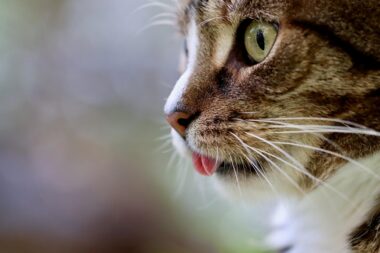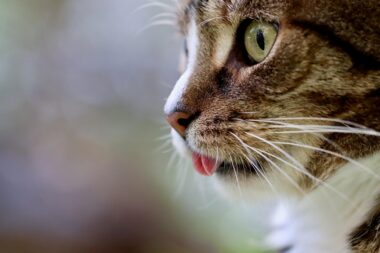Blockchain Technology in Cat Vaccination Data Security
As the landscape of veterinary care evolves, the importance of data security has never been more prominent, especially in cat vaccinations. Traditional record-keeping methods are vulnerable to fraud and manipulation, putting a cat’s health at risk. This is where blockchain technology comes into play, offering a decentralized system for managing important vaccination data effectively. Each vaccination record can be securely stored in a blockchain, where it becomes immutable and easily accessible by authorized parties. By implementing this technology, veterinarians can enhance their practices significantly, providing more reliable and transparent records for each pet. Blockchain can facilitate a shared online ledger that includes vaccination dates, types administered, and any adverse reactions. This shared accessibility not only improves transparency but also allows for instant verification of data during audits. By utilizing blockchain, we give pet owners peace of mind, knowing that their cats’ vaccination histories are managed securely. It ensures that their pets receive proper care based on accurate, tamper-proof data, paving the way for a more trustworthy veterinary landscape. Thus, understanding blockchain’s role is vital in revolutionizing cat vaccination management.
Enhancing Data Integrity and Transparency
Data integrity is crucial when it comes to cat vaccinations, as incorrect records can lead to severe health implications. Utilizing blockchain technology ensures data remains unaltered, providing a framework where each entry about a cat’s vaccination is permanently recorded. This permanence is crucial in preventing misinformation regarding a pet’s health status. With blockchain, a vaccination record for each cat cannot be changed once written, minimizing the risks associated with fraudulent entries. Moreover, transparency extends to pet owners who have easy access to their cats’ vaccination data through a secure application, allowing them to track and verify all treatments. Such an approach fosters trust between pet owners and veterinarians, strengthening the relationship built on reliable information. The decentralized nature of blockchain technology means that no single entity has control, which reduces the risk of data breaches and fosters a secure environment for sensitive information. The outcome is not just a change in technology but a shift in how we perceive data related to cat healthcare. Thus, embracing blockchain leads to healthier and safer practices within veterinary care, creating better outcomes for cats.
Furthermore, by integrating blockchain technology, the logistics surrounding cat vaccinations also see significant improvement. As supplies need to be meticulously tracked, having an immutable record of each vaccination batch’s details ensures that all vaccines administered are authentic and effective. This capability is especially crucial for combating counterfeit medications that can harm pets and undermine public trust in veterinary services. Efficiently tracking vaccine inventories through blockchain enhances overall inventory management, ensuring that veterinary practices have access to authentic vaccines. Moreover, it facilitates timely communication between suppliers and veterinary clinics, improving the efficiency of supplies while enabling the rapid recall of defective products when necessary. By doing so, veterinary practices can ensure that they are providing the best and safest options for every cat they treat. Veterinary professionals can prioritize responsible practices by embracing such technology, further demonstrating their commitment to providing excellent care tailored specifically for felines. Therefore, as we explore this technological shift, it becomes clear that blockchain technology’s potential to improve vaccination logistics is monumental, benefiting both veterinary health and pet owners alike. The reliability of such systems ultimately leads to better health for our beloved cats.
Streamlining Record Management Processes
When examining the role of blockchain technology, it becomes evident that record management processes can undergo a transformative upgrade. Traditional systems often involve manual data entries and documentation, which can result in human error and data loss. In contrast, a distributed ledger powered by blockchain simplifies record management, creating a seamless flow of information that benefits veterinarians and pet owners. Processes such as vaccination scheduling and updates can be automated, ensuring that cats receive timely vaccinations without delays. This electronic method allows for real-time updates in patient records and minimizes the administrative burden on veterinary staff. By digitizing these processes, clinics can focus more on patient care while ensuring that every detail is accurately captured without the risk of documentation mishaps. Furthermore, integration with pet wellness apps opens new possibilities for communication, enabling effective tracking of vaccination schedules and reminders for pet parents. Through a blockchain-enabled management system, veterinary practices can provide a comprehensive and user-friendly experience for all stakeholders involved, enhancing overall care practices for felines.
Moreover, blockchain technology encourages collaboration among different stakeholders in the feline health sector. With an open-source platform, veterinarians, pet owners, researchers, and even pharmaceutical companies can share critical information efficiently. This collaboration leads to improved outcomes in cat vaccination strategies and enhanced education about vaccination programs. By having shared networks, stakeholders can observe trends in vaccine efficacy and identify issues quickly, supporting research towards innovative vaccination solutions. Research and data can contribute to developing new vaccines or improving existing ones, resulting in decreased disease incidence. However, it is essential to ensure compliance with privacy laws when sharing this sensitive information among stakeholders. Blockchain provides a means to anonymize data while still extracting valuable insights, creating an environment in which knowledge sharing occurs without compromising individual pet owner security. As we move forward, understanding the collaborative possibilities of blockchain technology proves vital to reinvigorating the feline healthcare landscape, fostering partnerships that lead to better health solutions for all cats while meeting pet owners’ needs. This collaborative approach can grow the entire veterinary field.
Impact on Pet Owner Engagement
Engaging pet owners in their cat’s health management is vital for promoting responsible pet care. With blockchain technology facilitating secure access to vaccination records and health updates, pet owners become active participants in their cat’s healthcare journey. Empowered with this information, pet owners can make informed decisions regarding their cats’ health, helping reduce the risk of preventable illnesses. Positive engagement leads to better adherence to vaccination schedules, enhancing the overall health of the feline population. Pet owner engagement also allows them to contribute feedback on vaccination experiences, thus creating a loop of ongoing improvement within veterinary practices. Furthermore, the capability to access vaccination history on mobile applications fosters a community around feline health. It encourages pet owners to interact with each other and share insights, creating discussions on the latest treatment options available. As pet parents grow more engaged and educated, they embody advocates for their cat’s health, promoting better vaccination practices for all. Blockchain technology grants pet owners peace of mind while paving the way for a brighter future in feline health management, creating more knowledgeable and responsible pet guardians.
To conclude, the integration of blockchain technology in managing cat vaccination data heralds a new era of data security, transparency, and engagement. Transforming the way vaccination records are created, stored, and accessed empowers pet owners and veterinarians alike. The shift towards a decentralized ledger not only enhances the integrity of medical records but also drives collaboration between stakeholders in the veterinary field. Research-driven improvements can arise, addressing pressing challenges in feline healthcare. Furthermore, heightened transparency helps foster trust between pet owners and veterinary professionals, encouraging adherence to vaccination schedules and ultimately improving cats’ overall health. Blockchain technology may seem revolutionary for a traditional field like veterinary medicine, but it allows for modernization that drives progress. As we recognize the critical implications of secure data management, educating all parties—including pet owners—on blockchain’s advantages will be necessary. By encouraging widespread adoption, we can create an ecosystem of safety and well-being for cats everywhere. Thus, the future of cat vaccination is brighter than ever, presenting enormous opportunities for advancements in the care and understanding of feline health.
The demand for technological solutions in veterinary practices shows no sign of waning. As the world becomes increasingly interconnected, integrating robust solutions like blockchain will become vital in shaping future standards for cat vaccinations. By addressing existing challenges in data management and security, blockchain technology fosters increased trust within the community. As the veterinary field continues to evolve and develop innovative technologies, stakeholders must remain vigilant in adapting best practices for the welfare of all cats. This proactive approach will not only create a safer environment for our pets but also enhance the educational experience of pet owners involved in their care. With the growing importance of digital health records, ensuring that veterinarians are equipped with the necessary tools to manage this transition becomes essential. As such, engaging in ongoing education and training is crucial. Blockchain’s potential in the veterinary landscape is manifold, with benefits extending far beyond vaccinations alone. Creating a cohesive strategy for implementation may take time, yet the potential health outcomes for cats ensures that this investment is justified. By focusing on innovative solutions like blockchain technology, our collective vision for a healthier future for felines can be achieved.





